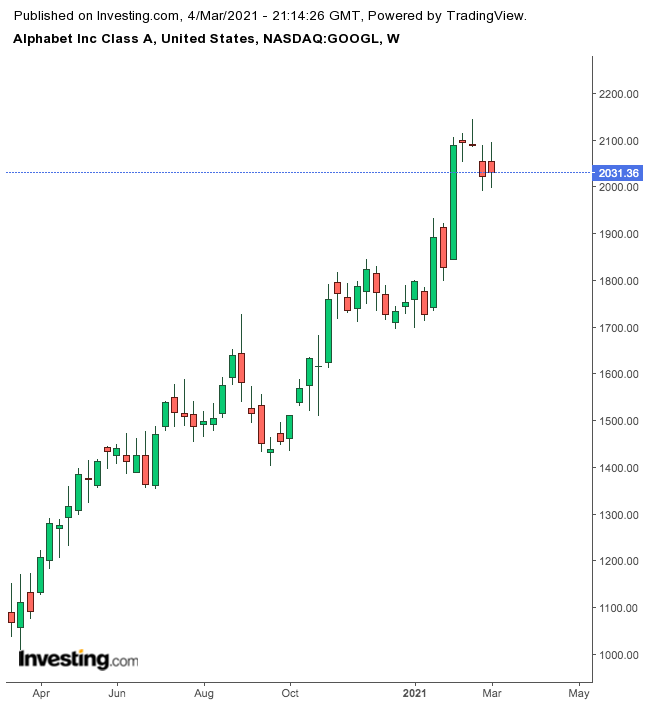Google parent Alphabet (NASDAQ:GOOGL) is proving to be a winning bet this year after being a laggard in 2020. At a time when investors are shunning growth names, its shares are sustaining the selling pressure much better than its technology peers.
Google stock is up more than 17% this year while the benchmark NASDAQ Index has gained just over 1%. This resilience of the search-engine behemoth is surprising, especially during the COVID-19 pandemic, which depressed its digital ad business as travel, restaurants and tourism-related sales plunged.

But after remaining a laggard in most of the last year when compared with other FAANG stocks—Facebook (NASDAQ:FB), Apple (NASDAQ:AAPL), Amazon (NASDAQ:AMZN) and Netflix (NASDAQ:NFLX)—Google is, so far, the best-performing mega-tech stock.
What’s attracting investors to buy Google shares is a clear sign that it’s emerging from the pandemic-triggered downturn much stronger, with its sales rebounding faster than expected. In the fourth quarter, Alphabet posted a record $56.9 billion in revenues, with sales at its advertising units surging 22% from a year earlier.
With that turnaround, it’s also encouraging for investors to see that the company’s efforts to diversify its sales away from its search-engine business are paying off. YouTube revenue, for example, soared 46% in the quarter, as the video-sharing platform reached more users between the ages of 25 and 49 than all cable networks combined.
Most Undervalued
Some bulls are advising investors to buy Google stock because it has more room to grow.
Morgan Stanley analyst Brian Nowak believes YouTube is “the most-undervalued ad platform” in the internet sector. With a strong recovery in the branded and direct response ad market, YouTube is well positioned to deliver 40%+ revenue growth in 2021, he wrote in a recent note, while raising his one-year price target to $2,200 from $2,050.
JP Morgan analyst Doug Anmuth also raised his Google one-year price target to $2,390 from $2,050, saying in a recent note, Alphabet’s rally “has legs” as travel ads have yet to rebound. Anmuth also noted that the company’s cloud-computing margins should improve going forward following years of heavy investment.
Another factor that is restoring investors’ confidence is the California-based company’s improving disclosure policy. In the latest earnings, Google revealed details about the costs of its cloud division for the first time.
While that unit lost $1.2 billion in Q4, investors are now in a better position to evaluate its performance against the cloud-computing units of Amazon and Microsoft (NASDAQ:MSFT), the two leading players in this business. In addition, for the time being, bullish forecasters do not see much threat to Google’s business from the multiple lawsuits, which have been filed by many states and the US Department of Justice. These lawsuits accuse Google of illegally monopolizing internet search and search advertising through a series of anti-competitive contracts and conduct, hurting consumers and advertisers in the process.
One reason why analysts aren’t factoring in the potential negative impact of these legal challenges is that these probes takes years to conclude and it’s almost impossible to predict the outcome. Microsoft, which faced an anti-trust lawsuit in the 1990s, is one example to support that argument.
Bottom Line
With its traditional growth drivers remaining unchallenged and the company positioning itself to grow faster in the post-pandemic world, Google’s shares are catching up after lagging behind in 2020. It might see more upside if the economy reopens quickly and small companies bring back their digital ad business.
